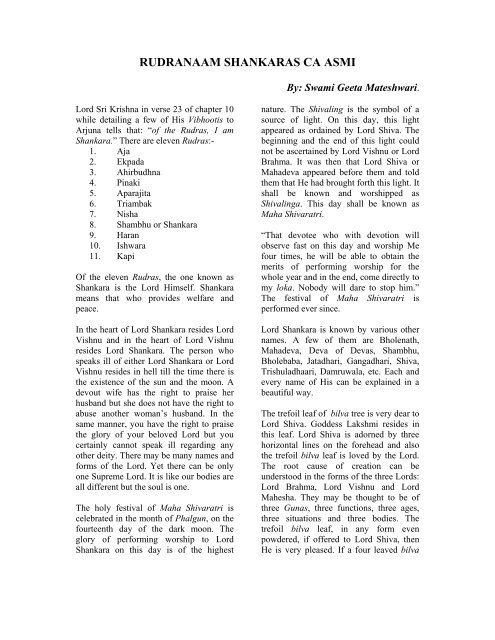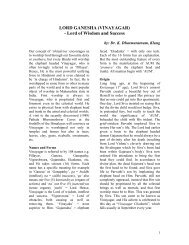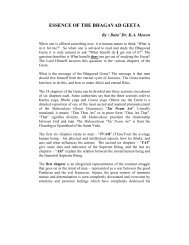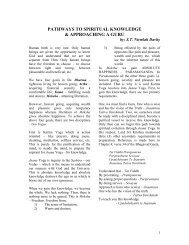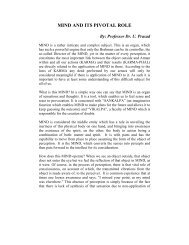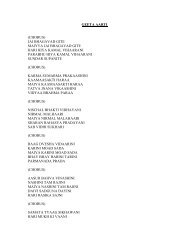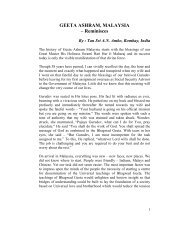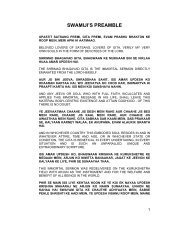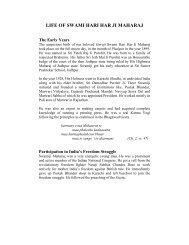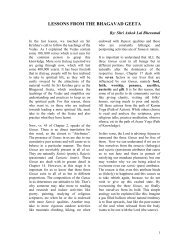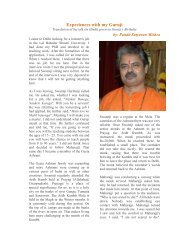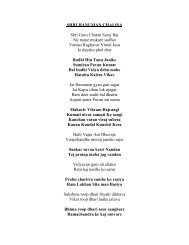You also want an ePaper? Increase the reach of your titles
YUMPU automatically turns print PDFs into web optimized ePapers that Google loves.
<strong>RUDRANAAM</strong> <strong>SHANKARAS</strong> <strong>CA</strong> <strong>ASMI</strong><br />
By: Swami Geeta Mateshwari.<br />
Lord Sri Krishna in verse 23 of chapter 10<br />
while detailing a few of His Vibhootis to<br />
Arjuna tells that: “of the Rudras, I am<br />
Shankara.” There are eleven Rudras:-<br />
1. Aja<br />
2. Ekpada<br />
3. Ahirbudhna<br />
4. Pinaki<br />
5. Aparajita<br />
6. Triambak<br />
7. Nisha<br />
8. Shambhu or Shankara<br />
9. Haran<br />
10. Ishwara<br />
11. Kapi<br />
Of the eleven Rudras, the one known as<br />
Shankara is the Lord Himself. Shankara<br />
means that who provides welfare and<br />
peace.<br />
In the heart of Lord Shankara resides Lord<br />
Vishnu and in the heart of Lord Vishnu<br />
resides Lord Shankara. The person who<br />
speaks ill of either Lord Shankara or Lord<br />
Vishnu resides in hell till the time there is<br />
the existence of the sun and the moon. A<br />
devout wife has the right to praise her<br />
husband but she does not have the right to<br />
abuse another woman’s husband. In the<br />
same manner, you have the right to praise<br />
the glory of your beloved Lord but you<br />
certainly cannot speak ill regarding any<br />
other deity. There may be many names and<br />
forms of the Lord. Yet there can be only<br />
one Supreme Lord. It is like our bodies are<br />
all different but the soul is one.<br />
The holy festival of Maha Shivaratri is<br />
celebrated in the month of Phalgun, on the<br />
fourteenth day of the dark moon. The<br />
glory of performing worship to Lord<br />
Shankara on this day is of the highest<br />
nature. The Shivaling is the symbol of a<br />
source of light. On this day, this light<br />
appeared as ordained by Lord Shiva. The<br />
beginning and the end of this light could<br />
not be ascertained by Lord Vishnu or Lord<br />
Brahma. It was then that Lord Shiva or<br />
Mahadeva appeared before them and told<br />
them that He had brought forth this light. It<br />
shall be known and worshipped as<br />
Shivalinga. This day shall be known as<br />
Maha Shivaratri.<br />
“That devotee who with devotion will<br />
observe fast on this day and worship Me<br />
four times, he will be able to obtain the<br />
merits of performing worship for the<br />
whole year and in the end, come directly to<br />
my loka. Nobody will dare to stop him.”<br />
The festival of Maha Shivaratri is<br />
performed ever since.<br />
Lord Shankara is known by various other<br />
names. A few of them are Bholenath,<br />
Mahadeva, Deva of Devas, Shambhu,<br />
Bholebaba, Jatadhari, Gangadhari, Shiva,<br />
Trishuladhaari, Damruwala, etc. Each and<br />
every name of His can be explained in a<br />
beautiful way.<br />
The trefoil leaf of bilva tree is very dear to<br />
Lord Shiva. Goddess Lakshmi resides in<br />
this leaf. Lord Shiva is adorned by three<br />
horizontal lines on the forehead and also<br />
the trefoil bilva leaf is loved by the Lord.<br />
The root cause of creation can be<br />
understood in the forms of the three Lords:<br />
Lord Brahma, Lord Vishnu and Lord<br />
Mahesha. They may be thought to be of<br />
three Gunas, three functions, three ages,<br />
three situations and three bodies. The<br />
trefoil bilva leaf, in any form even<br />
powdered, if offered to Lord Shiva, then<br />
He is very pleased. If a four leaved bilva
leaf is offered, it is even better; offering<br />
five leaved or six leaved one multiplies the<br />
effect much more. One is able to get the<br />
fulfilment of one’s desires by offering this<br />
leaf on Lord Shiva.<br />
Rudraksh, the holy bead is the form of the<br />
Lord Shiva Himself. Rudraksha is a<br />
combination of Rudra and Aksha. Rudra<br />
means Lord Shiva. Aksha means, eyes. It<br />
so happened that once Lord Shiva was<br />
sitting in meditation. Suddenly when he<br />
opened His eyes, teardrops fell from His<br />
eyes. Trees cropped up from the places<br />
where these teardrops had fallen. Lord<br />
Shankara than transplanted them to<br />
different places. The Rudrakshas are of<br />
varied types from one faced to many<br />
faceted ones. The person who wears the<br />
Rudraksha assumes the personality of<br />
Lord Shiva.<br />
The spirits run away at the sight of the<br />
Rudraksha. Poverty is also banished and<br />
the person is free from diseases.<br />
Lord Shiva travels on His bull called<br />
Nandi. Nandi represents Dharma. He is<br />
celibacy personified. His horns are<br />
symbols of forgiveness. His ears represent<br />
equanimity. Belief in God is represented in<br />
his eyes. Faith is his mind and intellect.<br />
Mother Parvati rides on the Lion. Lion<br />
represents power. Mother Parvati Herself<br />
is supremely powerful and therefore, has<br />
chosen the lion as her mode of travel.<br />
Lord Ganapati’s vehicle is the mouse.<br />
The vehicle of Lord Kartikeya is the<br />
peacock.<br />
In the durbar of Lord Shiva, many<br />
opposing forces are there but in full unity.<br />
The lion and bull are opposite of each<br />
other. The snake and the mouse are<br />
opposites. The snake and the peacock are<br />
also opposites. Yet there is no cause for<br />
friction. Hence Lord Shiva is telling us<br />
that there may be different types of<br />
individual constituting a family even then,<br />
they should all live together with love.<br />
They should not oppose one another. Lord<br />
Krishna has also said in the Gita<br />
“Sarvabhoota hitey rathah”.<br />
The Jiva is liberated upon reciting and<br />
realising Shiva.<br />
Worship of Lord Shiva is particularly<br />
beneficial during the month of Shravan,<br />
just after Guru Purnima. A person who<br />
worships Lord Shiva for one month<br />
continuously from the 3 rd day of Chaitre<br />
month, then he will realise his desire. An<br />
unmarried girl wishing for a suitable<br />
husband can do this puja and it is very<br />
effective. The same puja was done by<br />
Goddess Parvati as directed by Narad<br />
Muni. One has to offer jal (water), milk<br />
and bilva leaf for the whole month. Food<br />
should be taken only once during the<br />
whole day.<br />
Lord Shankar is called Bhole Nath, that is<br />
a very simple Lord. He is very easily<br />
satisfied with the shraddha offered by the<br />
devotee. Those who are dedicated to Lord<br />
Krishna can also worship Lord Shankara<br />
because Lord Krishna has said that among<br />
the Rudras, I am Shankara<br />
– “Rudranam Shankaras cha asmi.”


